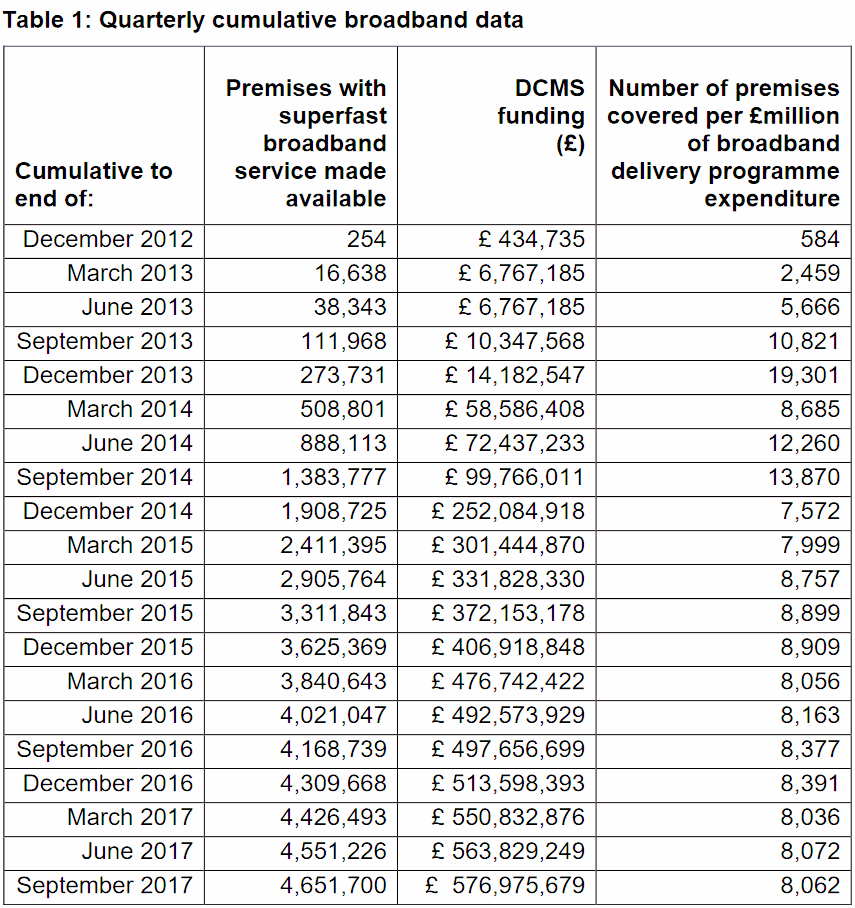Q3 2017 – UK Gov Extend Superfast Broadband to 4.65 Million Premises
The £1.6bn+ state aid supported Broadband Delivery UK project has published its latest progress update to September 2017, which confirms that it has so far helped 4,651,700 extra premises across the United Kingdom to be covered by a fixed “superfast broadband” (24Mbps+) network.
Today it’s estimated that approximately 94%+ of premises in the United Kingdom can access a fixed line superfast broadband connection and the Government’s goal is to cover 95% by the end of 2017, before potentially rising to around 98% by around 2020. Meanwhile the final 2% seems likely to be tackled via a mix of alternative network providers (altnets) and the forthcoming 10Mbps Universal Service Obligation (USO).
So far most of the BDUK linked roll-outs have been supported by Openreach’s (BT) ‘up to’ 80Mbps Fibre-to-the-Cabinet (FTTC) and a small bit of their ultrafast Fibre-to-the-Premise (FTTP) technology. More recently we’ve also seen altnets like Gigaclear, Call Flow, UKB Networks and Airband win a number of contracts, particularly around the more remote rural premises where Openreach tends to struggle.
Advertisement
Q3 2017 Progress Report
The “premises passed” figure used below only reflects those homes and businesses (premises) able to access “superfast” speeds of 24Mbps+ as a result of BDUK linked investment (i.e. it excludes those that have benefited but which only receive sub-24Mbps speeds). Similarly the data excludes “overspill effects” of BDUK-supported projects on premises which already have superfast broadband.
NOTE: The table only shows state aid from the Government’s project (BDUK) and does NOT include match-funding from local councils, the EU and other public or even private sources.

The headline figures used above are said to be cash based (i.e. when grants are made or budgets transferred). On an accruals basis, which matches costs incurred to the timing of delivery, cumulative BDUK expenditure to the end of September 2017 has been estimated as £597,943,768 and that equates to 7,779 premises covered per £million of BDUK expenditure (expenditure is higher for this because the work has been delivered in advance of payment).
Advertisement
The roll-out pace has slowed over the past year but that is not a surprise because the programme is now focusing on the most challenging rural and some tedious sub-urban locations (e.g. Exchange Only Lines), which take longer to reach, cost more and deliver fewer premises passed in the same space of time.
There’s also a question mark over the impact of clawback (gainshare) on the figures, which forces BT to return some of their public investment when take-up goes beyond the 20% mark in related areas. So far up to £477 million could potentially be returned (BT results), which can then be reinvested into further broadband improvements. Most of this may be used to bridge the gap between 95% and 98% coverage by 2020.
NOTE 1: Future deployment phases, such as those aiming to deliver coverage above 95%, will be adopting the slightly improved 30Mbps+ definition for “superfast broadband“. The EU and Ofcom have been using this definition for many years, although official BDUK contracts were slow to do the same.
NOTE 2: The above expenditure figures exclude support for Connection Vouchers, the Mobile Infrastructure Project, the Rural Communities Broadband Fund, the Market Test Pilots, DCMS administrative expenditure and the new “Full Fibre” programmes.
Advertisement
NOTE 3: As we reported in October 2017 (here), BDUK supported projects have overbuilt some of Virgin Media’s network to the tune of around 1 million premises, although such premises are not eligible for public funding and so haven’t been included into the above total.
NOTE 4: The commercial market (i.e. purely private investment) has already enabled operators, such as BT and Virgin Media, to extend the reach of superfast broadband to around 75% of UK premises. However the major operators’ tend to view many of those in the final 25% as being “not commercially viable,” hence the reason for BDUK being setup to boost the roll-out via public investment.

Mark is a professional technology writer, IT consultant and computer engineer from Dorset (England), he also founded ISPreview in 1999 and enjoys analysing the latest telecoms and broadband developments. Find me on X (Twitter), Mastodon, Facebook, BlueSky, Threads.net and Linkedin.
« Successful Trial Sees TFL Prep 4G Mobile to Cover London Tube from 2019
















































Comments are closed